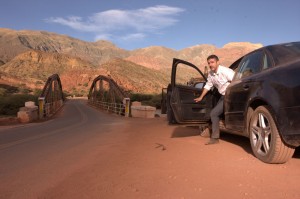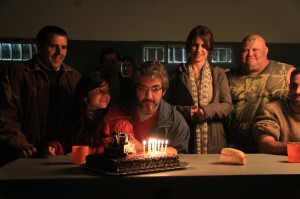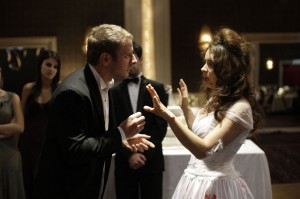 “Wild Tales” world premiered at the 2014 Cannes Film Fest–it was the only comedy in competition–to great acclaim. Sony Classics will release Argentine’s entry for the Best Foreign Language Oscar in November.
“Wild Tales” world premiered at the 2014 Cannes Film Fest–it was the only comedy in competition–to great acclaim. Sony Classics will release Argentine’s entry for the Best Foreign Language Oscar in November.
Origins:
These tales sprang from the most unrestrained corners of the imagination. While I was working to develop other projects–often dispirited by the fact that they were impossible to realize–I began writing a series of short stories to vent my frustrations.
Themes
 When I put them together in one volume, I realized that they were connected by a series of themes that provided unity and coherence: they were all about catharsis, vengeance and destruction, and the undeniable pleasure of losing control.
When I put them together in one volume, I realized that they were connected by a series of themes that provided unity and coherence: they were all about catharsis, vengeance and destruction, and the undeniable pleasure of losing control.
Inequality, injustice and the demands of the world we live in cause stress and depression for many people. Some of them, however, explode, and my movie is about those people.
Vulnerable in the face of a reality that shifts and suddenly turns unpredictable, the characters cross the thin line that divides civilization and barbarism.
Pleasure of losing control
A lover’s betrayal, a return to the repressed past and the violence woven into everyday encounters drive the characters to madness as they cede to the undeniable pleasure of losing control.
Western Society as Cage
 I frequently think of Western capitalist society as a sort of a transparent cage that reduces our sensitivity and distorts our bonds with others.
I frequently think of Western capitalist society as a sort of a transparent cage that reduces our sensitivity and distorts our bonds with others.
“Wild Tales” presents a group of individuals who live within this cage without being aware of its existence. But at that point where most of us would repress–or get depressed–these people shift into gear.
This involuntary project came together so quickly that it rose on my list of priorities and found a framework for production.
Reading as Act of Liberation
The telling of multiple stories represented an act of liberation for me, because it brought me back to falling in love with reading. I remember it as if it were yesterday: discovering in the family library a set of fiction anthologies that got my attention: Tales by the Masters of Crime, Tales by the Master of Mystery, and Tales by the Masters of Terror.
Later would come “Amazing Stories” (produced by Spielberg), “New York Stories” (by Scorsese, Coppola and Woody Allen) and J.D. Salinger’s “Nine Stories.”
The paths that all of these works forged in my consciousness configured my current space for creative liberty and experimentation.










